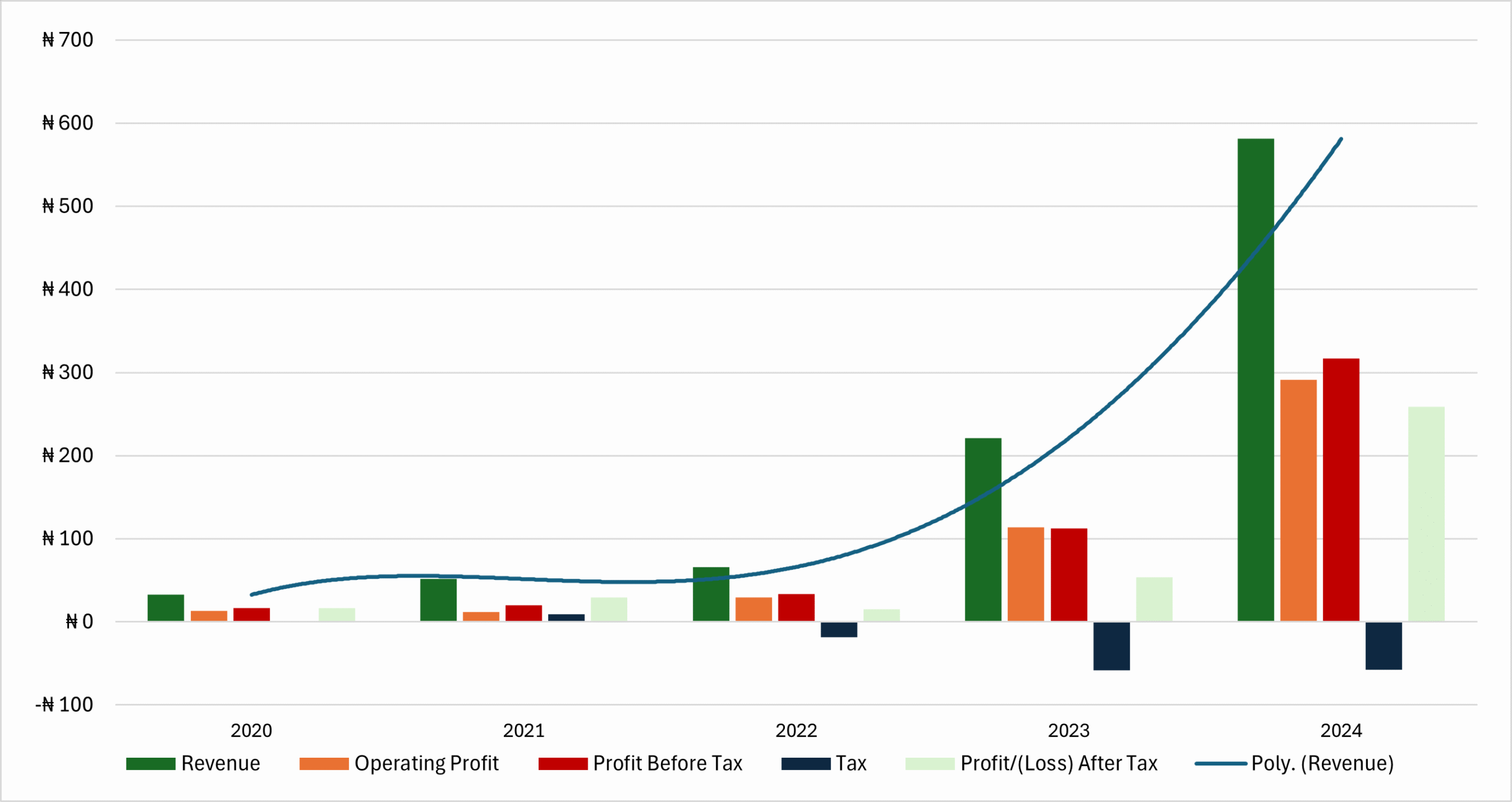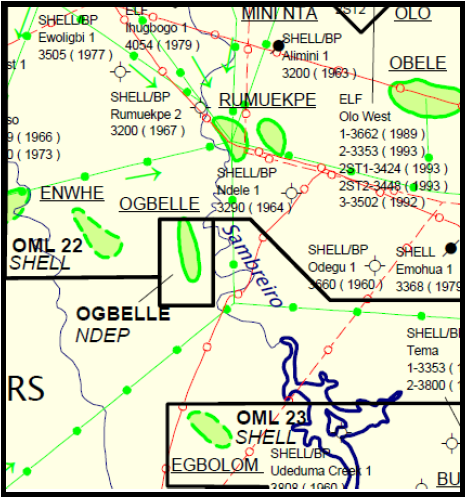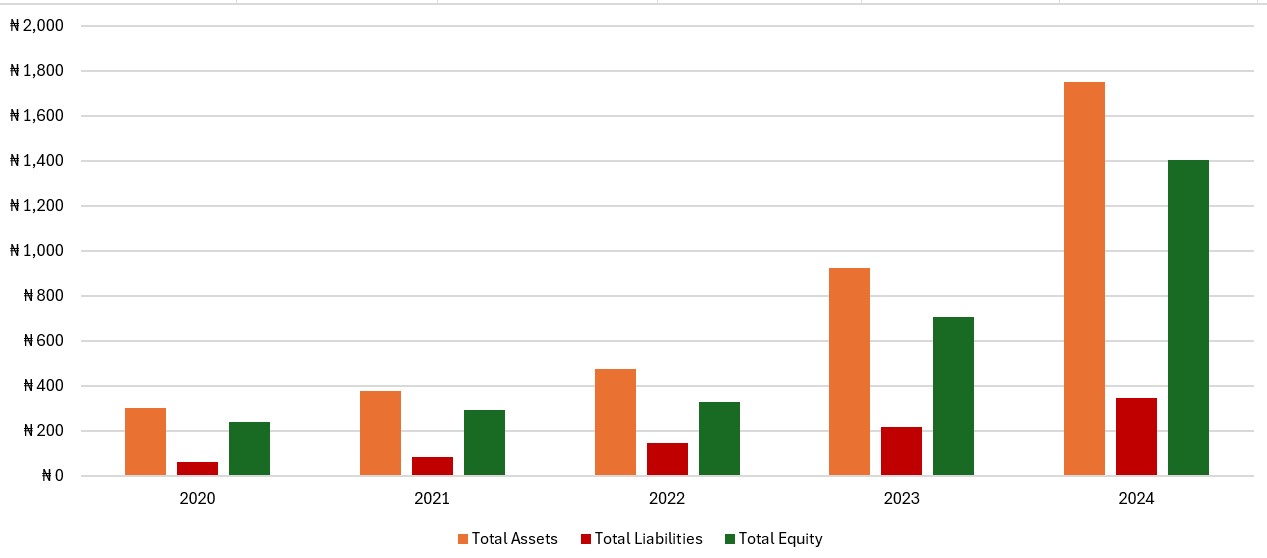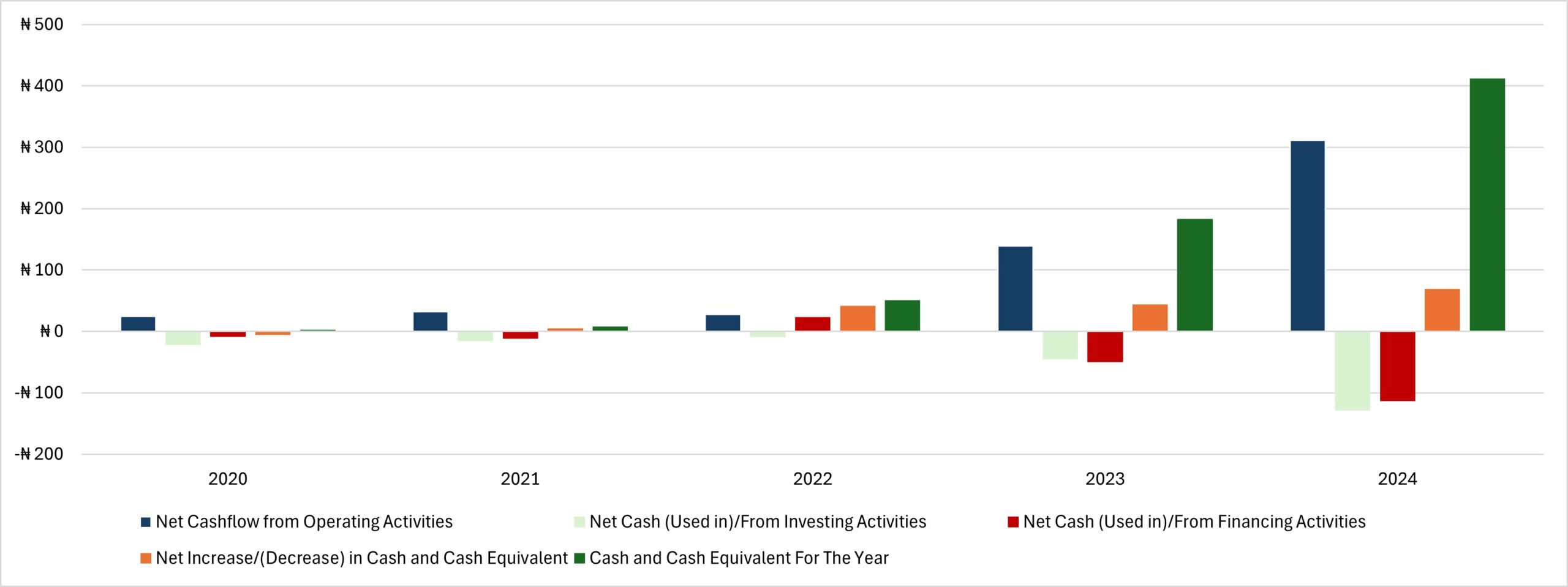Key Figures
Income Statement
Naira (₦)
| ₦'000 | 2020 | 2021 | 2022 | 2023 | 2024 |
|---|

©2025 AradelHoldings
For Aradel, social impact entails making positive and meaningful contributions to our communities and society at large through various activities and initiatives. Aradel values its employees and fosters a responsible, creative, and safe working environment with training for skill development. Our Health, Safety, and Environment policy lays the foundation for a safe and secure work environment. We continuously reduce our Total Recordable Case Frequency (TRCF) and adopt international best practices through our HSE team.
Through various initiatives, we empower communities, promote social development, thereby making a meaningful and ongoing impact on the lives of our host community members. Our focus areas encompass human capital development, economic empowerment, health, and infrastructure, ensuring a comprehensive and sustainable approach to community development.
Aradel considers the environment as a crucial aspect of its operations and aims to minimise its ecological footprint while promoting sustainability. Aradel promotes energy efficiency through various initiatives, minimizing wastage and reducing fuel consumption. We place a strong focus on energy conservation through awareness, monitoring electricity use, maintenance for improved efficiency, and using energy-saving devices. Aradel accords high priority to water and waste management.
Resource Conservation Procedure is at the heart of our commitment to efficiency and responsible resource utilisation. We employ innovative technologies and practices to optimise consumption, reduce waste, and contribute to a circular economy. The gas gathering facility installed at our Ogbele Integrated Facility ensures that routine flaring is eliminated in our operations in support of the environment.
Our commitment to environmental sustainability goes beyond mere compliance. It is a genuine internal pledge to leave the environment in a better state for future generations. We hold ISO 14001:2015 certification (EMS 760652), affirming our dedication to effective environmental management practices. The Environmental and Social Policy guides our efforts in protecting and preserving the environment, as well as engaging with our stakeholders. Aradel has demonstrated its commitment to sustainability by endorsing the 'Zero Routine Flaring (ZRF) by 2030' initiative of the World Bank and has been recognised for its efforts in this area.
Access to reliable and affordable energy is crucial for driving economic development and improving the quality of life in communities. Aradel acknowledges the importance of energy access and works towards providing sustainable energy solutions to underserved areas. We offer an increasingly diverse energy mix, with a greater focus on gas development as the energy transition evolves and progresses. This energy transition contributes to reducing pollution, improving air quality, and mitigating the environmental impact from our operations.
Nigeria's electricity generation capacity is very low relative to its population size. This, coupled with continued fast growth in its population, is resulting in lower energy access on a per capita basis. This underscores the pressing need, and opportunity, to address the challenges associated with scaling up power infrastructure, deepening the penetration of solar electricity to underserved localities across the country and the African continent as a credible poverty alleviation tool to secure a stable and prosperous future for millions of Africans.
The implementation of the ‘Decade of Gas Programme’ in Nigeria which is set to run from 2021-2030 and is aimed at achieving industrialisation, economic prosperity and tackling energy poverty by using gas as an enabler is one of the first steps put in place to achieve energy transition in Nigeria. Aradel firmly supports this agenda and is actively participating in driving the attainment of a gas-powered economy by 2030.
As a Company founded by Nigerians, we are deeply committed to giving back to our host communities and ensuring the well-being of both the people and the environment. We develop and maintain strong community relations, helping to maintain peace and stability. By investing in social activities, Aradel strengthens community bonds, empowers individuals, and builds a sense of belonging and pride, ultimately creating a resilient and thriving community.
With a strong focus on giving back to and building communities, Aradel operated a Host Communities Development Trust since 2002 till August 2022, a template that has been adopted by the the Petroleum Industry Act of 2021.
Aradel's approach to community engagement goes beyond mere compliance. We strive to create shared value by implementing social investment initiatives, fostering economic empowerment, and promoting environmental stewardship. Through transparent communication, infrastructure development initiatives and capacity building programmes, we aim to uplift the quality of life for our host communities, leaving a positive and lasting impact for generations to come.
By upholding our principles of community engagement, sustainable development, and stakeholder collaboration, Aradel continues to foster positive change and exemplify responsible corporate citizenship in the oil and gas industry.
Aradel is committed to implementing impactful projects that drive positive change. We identify and invest in projects that align with the United Nations' Sustainable Development Goals (SDGs) and contribute to shared prosperity. These projects range from community-based infrastructure development to supporting education and skills training programs. By addressing the pressing needs of the communities, we aim to create a lasting impact and improve the overall well-being of individuals and society.
The completion of legacy projects and initiation of new ones demonstrate our commitment to community development and environmental stewardship. These infrastructure investments improve living conditions, enhance safety, and foster economic activities. Additionally, Aradel's support for cultural and educational events promote knowledge sharing, cultural enrichment, and industry development. These impact projects contribute to environmental friendly development, community resilience, and the overall well-being of the regions where the Company operates.
Several compelling advantages offered by our projects are: Infrastructure Development, Improved Safety and Livability, Enhanced Social Services, Economic Opportunities and Cultural Preservation.
Aradel understands that sustainable economic development is essential for shared prosperity. Aradel's operations have far-reaching implications for the nation's economic landscape. By reducing flaring and maximising the economic value of energy resources, Aradel creates employment opportunities directly and indirectly. We contribute to the overall growth of the country, positively impacting the nation's GDP. Furthermore, our compliance with tax regulations ensures that we fulfill our tax obligations, supporting government revenue and enabling investments in public services and infrastructure development.
Our dedication to the local workforce is a cornerstone of our economic contributions. Through recruitment, training, and capacity building initiatives, we create employment opportunities that empower individuals and strengthen local talent. By providing fair compensation and fostering employee development, we enhance livelihoods and contribute to the economic well-being of individuals and their families. Collaboration with local businesses and suppliers is another aspect of our commitment to economic growth. As we give precedence to sourcing from local vendors, we stimulate economic activity throughout the value chain. This approach promotes vendor growth, job creation, and business expansion, fostering a thriving local economy and enhancing the ecosystem's resilience.
Furthermore, Aradel's economic contributions extend to the host communities. Our operations generate increased income levels, contribute to poverty reduction, and create a more prosperous environment. As we support economic growth, we uplift the overall well-being and quality of life within the communities where we operate. Click here to read more about the impact we are having in our host communities.
Through these comprehensive economic contributions, Aradel drives sustainable economic development, fosters shared prosperity, and establishes a positive ripple effect that benefits the nation, adheres to regulations, empowers employees, supports vendors, and enhances the overall economic landscape for the community.
At Aradel, environmental stewardship is deeply embedded in our culture and operations, reflecting our commitment to safety and a sustainable future. We go beyond regulatory requirements, actively monitoring our performance and seeking continuous improvement.
Our highly skilled HSE team ensures adherence to global standards, implementing effective environmental management systems. By engaging stakeholders and investing in innovative solutions, we collaboratively minimise waste, optimise resources, and prevent environmental incidents. Our efforts extend to community engagement and technological advancements. Through training and embracing emerging technologies, we empower our employees to uphold environmental values and drive positive change.
As we implement rigorous safety protocols, regular risk assessments, and comprehensive training programmes, we maintain a secure work environment across our operations. Our efforts have resulted in a significant reduction of technical flaring to less than 0.05% of the total gas produced in the Ogbele Field.
Aradel is committed to promoting energy efficiency in all our facilities. Through active energy conservation awareness, continuous monitoring of electricity use, routine maintenance to improve machine efficiency, and the utilisation of energy-saving electronic devices, we have significantly reduced fuel consumption. Our dedication to energy efficiency extends to reducing our environmental footprint and contributing to a green future.
Our upstream operations encompass a wide range of activities from exploration to exports, ensuring a reliable and sustainable supply of oil and gas. We are dedicated to harnessing the full potential of Nigeria’s energy resources.
At Aradel, we deploy cutting-edge technologies and expertise to identify and evaluate potential hydrocarbon resources. Our team of geoscientists and petroleum engineers meticulously analyse geological data, conduct seismic surveys, and interpret subsurface structures. Through advanced techniques, we aim to uncover new exploration prospects and unlock untapped reserves. Upon the identification of prospects, we conduct a thorough evaluation to assess their commercial viability. This process ensures sound decision-making and optimal resource allocation.
We work with best-in-class engineers to execute and manage drilling operations with a strong focus on safety, efficiency, and environmental responsibility. Being a Company focused on ensuring continuous operations and value creation, we implemented an Alternative Crude Evacuation (ACE) path to help us mitigate the impact of crude theft in our operating region; thus, creating an additional value realisation pathway for our business.
Aradel prioritises the health and safety of employees, contractors, and the environment. Our robust HSE management system ensures compliance with standards and regulations. We implement rigorous safety protocols, conduct regular risk assessments, and provide comprehensive training to maintain a safe and secure work environment.
Our midstream Gas Plant operations form a crucial component of our energy supply chain, focusing on natural gas processing, transportation, and distribution. Through gas gathering and processing, transmission pipelines, compression facilities, storage, LNG terminals, and distribution networks, we ensure the reliable and safe delivery of energy from our production sites to our end users. Our gas processing plants are currently located in our Ogbele and OML 34 assets.
Aradel has invested heavily in infrastructure to harness the full potential of the Ogbele field. The Ogbele Gas Processing Plant was built by Aradel to develop and monetise the gas Resources on the Ogbele Field while complying with the Federal Government’s Gas Flare policy for production operations. A 12’’ x 20km Gas Delivery Pipeline was constructed to deliver gas processed from the Gas Plant to the Bonny NLNG.
In 2012, Aradel became the first Nigerian Independent Oil & Gas Company to deliver non-JV Gas volumes to the Bonny NLNG system via a Gas Sale and Purchase Agreement (GSPA) with the Shell Petroleum Development Company of Nigeria/Total Energies/Nigerian Agip Oil Company/Nigerian National Petroleum Company Joint Venture. Since then, Aradel has begun the delivery of domestic gas supply to local off-takers. Other private companies have also expressed interest in purchasing gas directly from the Ogbele Plant. The Company captures all the associated gas that would have been flared and compresses it to create value. Routine flaring is completely eradicated, and only Non-routine (pilot) flares can be seen at the facilities.
Aradel endorsed the ‘Zero Routine Flaring (ZRF) by 2030’ initiative of the World Bank and in recognition of its effort, the company received the Excellence Award from the Global Gas Flare Reduction (GGFR) Forum, an arm of the World Bank in 2015. The company is aiming for zero gas flare in other assets where it has interests.
In addition, our OML 34 asset which is operated by an Asset Management Team comprising of personnel from NNPC (the Operator on record with a 55% participating interest in the asset) and ND Western Limited (the Special Purpose Vehicle through which the Aradel led consortium acquired a 45% participating interest in the asset) in which Aradel is a significant Shareholder) has two gas processing plants with a combined production capacity of over 400MMscf/d. Due to its high gas reserves and production capacity, the asset supplies gas to neighbouring countries including Benin, Togo, and Ghana through the West African Gas Pipeline (WAGP). Associated gas gathering projects and non-associated gas projects are ongoing on the asset.
Our downstream operations incorporate a range of activities involved in the refining, processing, distribution, and marketing of refined products. As an integral part of the oil and gas value chain, our downstream operations play a crucial role in transforming crude oil into various valuable end-products that meet consumer demand. Our refining process includes crude oil distillation, conversion, and product blending after which our refined products are stored and distributed.
In 2010, the Company commissioned a 1000bbls/d Mini Refinery for the extraction of Automotive Gas Oil (AGO) also called diesel, from crude oil produced from the Ogbele field. Aradel was the first of such private refineries in Nigeria to receive a License to Operate (LTO) from the Federal Government. In 2014, Aradel celebrated the 1,000th Diesel Truck Load Out from the Mini Refinery.
Today, our Ogbele asset houses our 11,000bbls/d three-train modular refinery that produces 5 different refined products: Automotive Gas Oil (AGO), Household Kerosene (HHK), Marine Diesel Oil (MDO), High-pour Fuel Oil (HFO) and Naphtha. In 2022, after the successful debottlenecking of refinery operations and its decoupling from upstream production, refined volumes grew substantially, a trend we intend to capitalise on in the coming periods as we grow various parts of the business simultaneously. Through strategic partnerships, we have expanded our refined product distribution channels which have helped increase our delivery volumes and enhance our pricing dynamics. We also plan to venture further into downstream gas investment in the form of petrochemicals and LPG in the future.
As the global energy landscape rapidly evolves, Aradel recognises the importance of embracing the energy transition and taking proactive steps toward a sustainable future. Energy transition holds significant potential for achieving multiple economic and sustainable objectives, including decarbonisation, energy access, economic development, and climate resilience. We understand the need to reduce carbon emissions, mitigate climate change, and diversify our energy sources. Our commitment to energy transition is evident with the commissioning of our 100mmscf/d gas plant in 2012..
The implementation of the ‘Decade of Gas Programme’ in Nigeria which is set to run from 2021-2030 is aimed at achieving industrialisation, economic prosperity, and tackling energy poverty by using gas as an enabler is one of the first steps put in place to achieve energy transition in Nigeria. Aradel firmly supports this agenda and is actively participating in driving the attainment of a gas-powered economy by 2030.
Innovation is an essential factor for a successful energy transition; and Aradel’s pedigree in being innovative is demonstrated by its pioneering of many oil and gas initiatives such as negotiating the first ever farm-out agreement in 2000, commissioning a 1,000bbls/d refinery in 2010 and becoming the first fully integrated indigenous company. We continue to invest in research and development to explore new technologies and solutions and we are also collaborating and forming strategic partnerships across all sectors with local and international organisations, government, and communities to foster knowledge sharing, joint research, and innovation.
With a strong commitment to responsible business practices, environmental stewardship, and social responsibility, Aradel is dedicated to driving energy transition in Nigeria and contributing to the global shift towards cleaner energy alternatives.
One of the central elements of the energy transition is the accelerated deployment of renewable energy sources. Nigeria and several African countries possess abundant renewable energy resources, such as solar, wind, hydro, and geothermal.
Aradel acknowledges that renewable energy sources play a crucial role in achieving a low-carbon future, hence our commitment to investing in renewable energy projects that harness the power of solar, and other sustainable sources. By diversifying our portfolio, we aim to reduce our carbon footprint while creating opportunities for sustainable economic growth.
The Ogbele Marginal Field, located in Rivers State is Aradel’s flagship asset. The Company acquired the Ogbele Marginal Field, situated within the OML 54 block, in 2000 from the NNPC/Chevron Joint Venture (JV). It was the first ever Marginal Oil Field Farm-Out Agreement to be negotiated in Nigeria, between a Multinational /NNPC JV and a Nigerian Independent Company.
Oil production commenced in November 2005 and in 2010, a 1000bbls/d diesel topping plant was installed. Since then, the field has developed into a fully integrated oil and gas-producing asset.
NB
Operator - Aradel
Partners - None
Working Interest - 100%
Main Fields - Ogbele
Acreage Size - 22.53 sqKm
Loss time injury rate - 0

The Omerelu Field is located in OML 53 about 42 kilometres Northwest of Port Harcourt in Rivers State, Nigeria. The Company acquired a 100% stake and operatorship of the Omerelu Field in 2014 from the NNPC/Chevron Joint Venture.
The field license for OML 53 was renewed for 3 years in January 2021.
NB
Operator - Aradel
Partners - None
Working Interest - 100%
Main Fields - Omerelu
Acreage Size - 11sqKm
OPL 227 is located 40km offshore Niger Delta and covers an area of 974km. The field is bounded to the North by OML 109 and the Ogedeh/Akepo Marginal fields (OML 90), to the East by OPL 282, to the West by OML 79, and to the South by OML 88. The asset was awarded to a consortium of ADDAX Petroleum Limited, Express Petroleum and Gas Company Limited, Petroleum Prospects International Limited, and Aradel. With the exit of Addax Petroleum from the asset, Aradel was nominated as the Operatorby the partners subject to approval of the regulator which is currently being processed. As part of its mandate to fast-track the development of the asset, an extensive review of previous works was carried out and, we look to embark on further exploration activities.
The field license for OPL 227 was renewed for 3 years in March 2021
NB
Operator - Aradel
Partners - Express Petroleum & PPI
Working Interest - 6% plus an additional 45% awaiting ministerial approval N/Adel
Main Fields - Oma
Acreage Size (3D Seismic coverage) - 500 sqKm
Our Purpose
Our purpose is to:
Our Strategy
Our strategy is anchored on three pillars – resilience, robustness and redundancies (the 3Rs), the integration of which is enabling us to confidently drive our businesses forward, prepare to overcome challenges, capitalise on opportunities and deliver consistent value to all our shareholders and other stakeholders.




